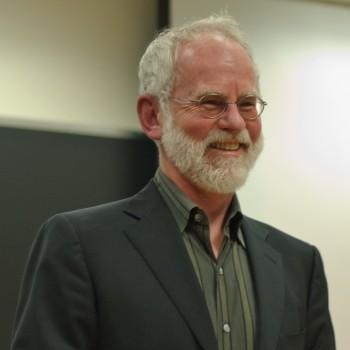
Stanford Education Professor Roy Pea honored for achievements in learning sciences
Stanford Graduate School of Education Professor Roy Pea was among the 2022 winners of the prestigious Harold W. McGraw, Jr. Prize in Education.
The award, announced Sept. 27 by the McGraw Family Foundation and the University of Pennsylvania’s Graduate School of Education, recognized Pea’s extraordinary achievements in the learning sciences. Cheryl Logan, superintendent of Omaha Public Schools, and Barry Dunn, president of South Dakota State University, also were recognized for K-12 and university education, respectively.
"The McGraw Prize was established in 1988 to honor my father's commitment to literacy and education and to shine a spotlight on innovative and dedicated educators who empower our students and enhance our society,” said Harold McGraw III, former Chairman, CEO and President of The McGraw-Hill Companies. “I salute this year's winners -- Cheryl Logan, Barry Dunn and Roy Pea -- who meet the highest standards of excellence and who have changed the lives of so many by their leadership and passion."
The 2022 winners:
- Learning Science Research Prize: Dr. Roy Pea’s work to enhance learning for people of all backgrounds and circumstances has been propelled by a spirit of innovation, impact and leadership lauded by the McGraw Prize. At Stanford University, he was the director of the H-STAR Institute and co-director and co-principal investigator of the LIFE Center. Pea’s body of work is vast; he has built training programs in learning technology and design at universities, created research partnerships, and developed professional development programs for teachers and K–12 learning technologies. He is a past president of the International Society for the Learning Sciences and co-author of the 2010 National Education Technology Plan for the U.S. Department of Education.
- Pre-K–12 Education Prize: Dr. Cheryl Logan, superintendent of Omaha Public Schools since 2018, has spent her career building engagement and alignment among all the key stakeholders in student success. Her innovative leadership during the COVID-19 pandemic and commitment to providing opportunities for students to achieve their highest potential embody the essence of the McGraw Prize. Logan led the district through a groundbreaking SARS-CoV-2 testing pilot study with the University of Nebraska Medical Center, enabling Omaha to be one of the first large, urban school districts in the nation to return to in-person learning in 2020.
- Higher Education Prize: Dr. Barry Dunn’s work to improve college access for Native Americans advances the principles of equity and inclusion and demonstrates the power of education to elevate human potential, two core principles of the McGraw Prize. Dunn is president of South Dakota State University, where he created the Wokini Initiative to increase programming and support for students from South Dakota’s nine tribal nations. He was also instrumental in advocating for a new federally funded grant program for tribal students at 22 land grant universities and tribal universities.
“These inspiring education leaders have changed the lives of so many individuals through their work. Each represents the best in our field and what it means to be an educator. Their impact is profound, and we are so proud to honor their outstanding contributions,” said Pam Grossman, dean of Penn GSE and a leading expert on teacher quality.
The Harold W. McGraw, Jr. Family Foundation selected Penn GSE as the home for the McGraw Prize in 2020. The partnership includes administering the annual prize, an awards ceremony and celebration in November and ongoing programming with more than 100 past winners, including symposiums and a webinar series.
Through a public nomination process, McGraw Prize awardees were submitted for consideration by their peers, with winners then selected during three rounds of judging, including a final round by an independent panel of esteemed leaders in the field. Past winners have included teachers, professors, superintendents, university presidents, non-profit leaders, entrepreneurs and public officials.
___
This story was adapted from the press release posted at University of Pennsylvania Graduate School of Education.
Faculty mentioned in this article: Roy Pea



